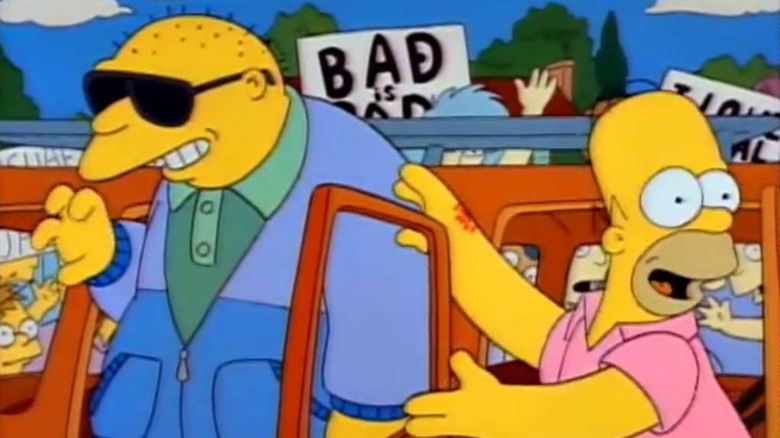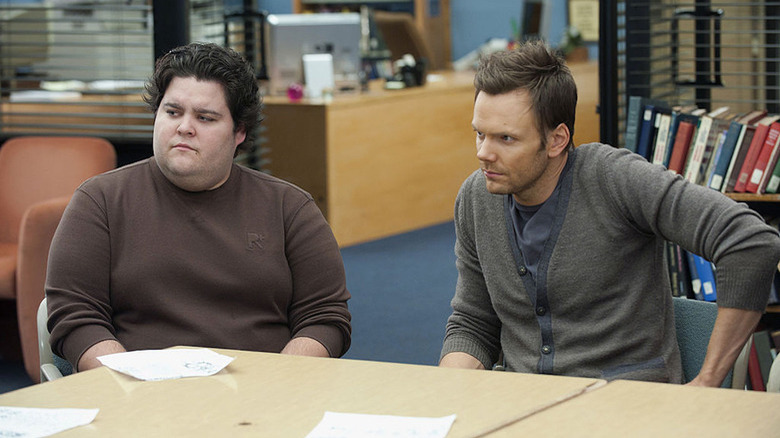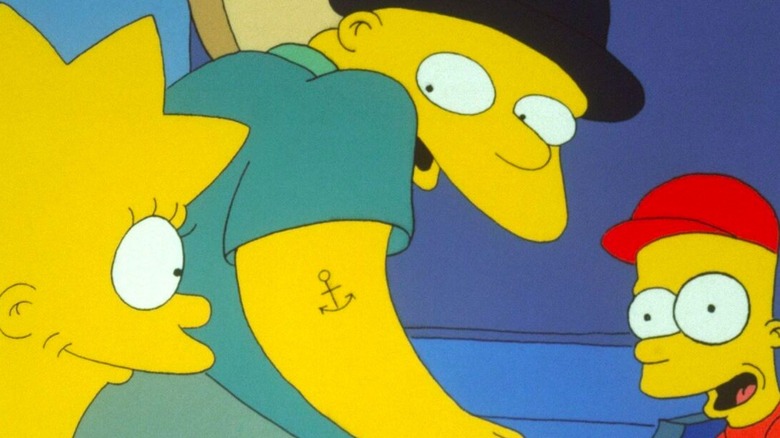The Simpsons Season 3's Banned Michael Jackson Episode, Explained
With any TV show that goes on for thirty-six years and counting, there will inevitably be something from an early episode that comes back around to haunt it. The "South Park" showrunners have written entire episodes apologizing for poorly-aged takes they gave in their early years, while "Family Guy" has had their characters outright say that they're now "phasing out the gay jokes" that were all too common in their early seasons.
Meanwhile, "The Simpsons" ended up the center of a national conversation around 2020 about the ethics of having white voice actors play non-white cartoon characters, leading to the show giving Dr. Hibbert a new voice actor who unfortunately couldn't quite pull off the character's trademark laugh. They've also quietly phased Apu out of the show entirely, after comedian Hari Kondabolu sparked a nationwide discussion over the character's legacy as one of the only Indian characters so many Americans were familiar with for decades. The fandom debate around both these issues is ongoing, and it's still messy and heated to say the least.
One of the show's biggest apologies, however, is something that doesn't seem to be talked about quite as often among the fans: the erasure of season 3's "Stark Raving Dad." In 2019, the streaming service Disney+ quietly pulled the episode from its platform, and the "Simpsons" producers chose to pull the episode out of syndication. This was in response to the growing allegations that the episode's main guest star, Michael Jackson, had molested multiple children.
Although Jackson had died ten years earlier and was never found guilty in a court of law, the HBO documentary film "Leaving Neverland" in 2019 brought a lot of the allegations against him back into the public eye, and they looked pretty damning. Executive producer James L Brooks described banning "Stark Raving Dad" as "the only choice to make," and added, "I'm against book-burning of any kind. But this is our book, and we're allowed to take out a chapter."
It's part of an ongoing debate about messy TV history
"Stark Raving Dad" is the only out-right banned episode of "The Simpsons" in America, although it wasn't the first to be pulled from syndication. After 9/11, networks stopped airing reruns of "The City Of New York vs. Homer Simpson," a 1997 episode that very prominently featured the Twin Towers. But this episode was brought back after a few years under the assumption that Americans had healed from the traumatic event; meanwhile, it doesn't seem like "Stark Raving Dad" is being brought back any time soon. That's because the New York episode was removed simply out of tact, whereas the Michael Jackson-centric episode was removed out of a sense of morality, with the main question here being: is it morally acceptable for the show/network to profit off of that episode?
Similar conversations have played out over the years around previous TV episodes that featured white characters wearing blackface. Entire episodes of shows like "Community," "It's Always Sunny in Philadelphia," and "Mad Men" were pulled from certain streaming platforms for their use of blackface, regardless of the context or (in the case of "Mad Men") the time period the show was depicting. The argument in favor of banning these episode is generally that they promote harmful/insulting stereotypes that no longer reflect (or rather, should not reflect) modern sensibilities. On the other side, the argument against banning these sorts of episodes is that it comes across as a shallow attempt to sanitize history, when it would be better to let those episodes stick around and serve as an uncomfortable reminder of how the world used to be.
So, how was Stark Raving Dad as a Simpsons episode?
Even if you ignore the giant elephant in the room, "Stark Raving Dad" isn't one of the best episodes of the consistently strong third season, but it still serves as an interesting look back at Michael Jackson's reputation in 1992. There were the obligatory jokes about Jackson's lightening skin color of course, as well as a general sense that the best days of Jackson's career were behind him, but he was still very widely known and beloved throughout the whole world. When Bart lets slip that Michael Jackson's visiting Springfield, the entire town is whipped into an excited frenzy.
The episode also brings an air of mysticism to Jackson, refusing to confirm until the very end whether the Jackson impersonator (actual name: Leon Kompowsky) is truly him or not. This confusion was heightened by the way Michael Jackson himself wasn't officially credited for the episode until years later, leading to a lot of debate over whether that was his voice we were hearing. Complicating things further was the reveal that yes, that was Jackson's voice during the regular dialogue, but it wasn't his voice whenever the character sung; the singing was performed by a soundalike actor Kipp Lennon, due to complicated contractual obligations Jackson had with his recording studio.
The end result is that "Stark Raving Dad" is still an entertaining watch, but only if you look at it as a history lesson about a more innocent time in American pop culture. There's no easy answer for what to do with an episode like this, but its adoration for Jackson does at least help explain why the world was so willing to sweep the allegations against him under the rug. (The first major allegation against Jackson was way back in 1993, 26 years before "Leaving Neverland" released.) He was the King of Pop, after all, and he sang that sweet Happy Birthday song for Lisa; few wanted to believe he was capable of such horrible things.


